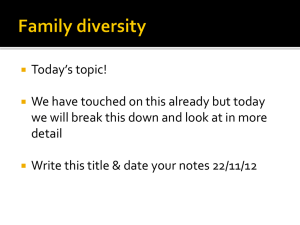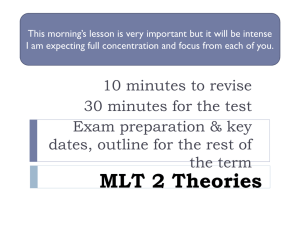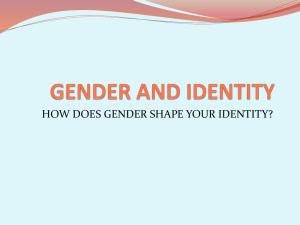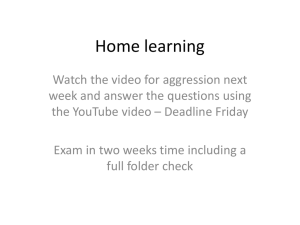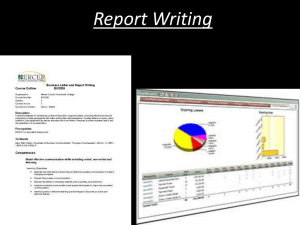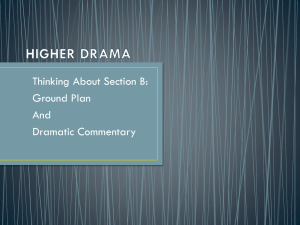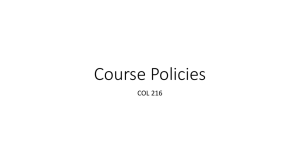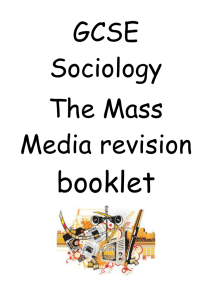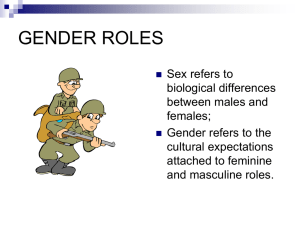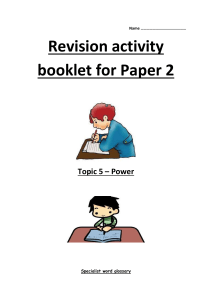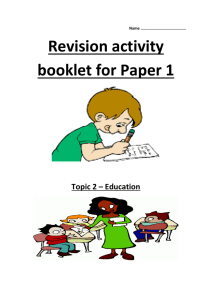Mass Media
advertisement
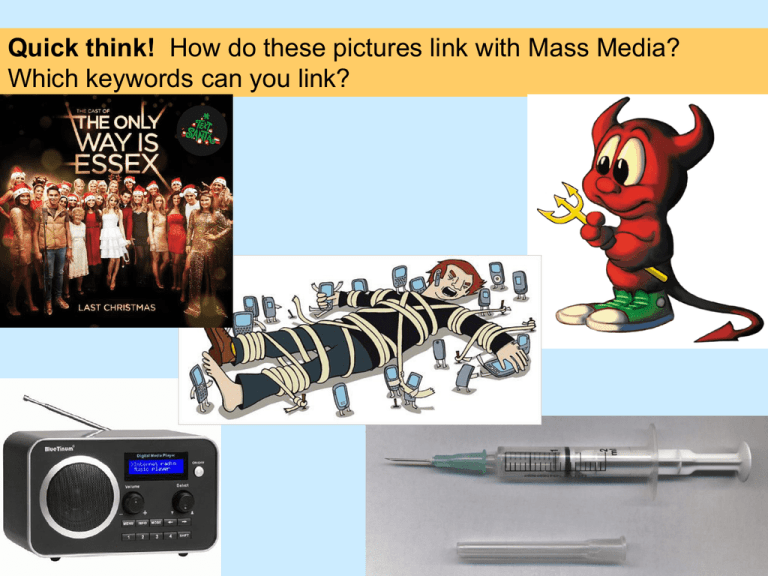
Quick think! How do these pictures link with Mass Media? Which keywords can you link? How have technological developments changed the way we are manipulated by the media? What is mass media & how has it changed? Mass Media How do politicians manipulate the media? How does the mass media secondary socialise us? How do the media gatekeepers control what information we receive? Session 1 – Mass Media & Technological change Key concepts revised today Define mass media and give examples Describe the relationship between the mass media and its audience and explain how this may be affected by new technologies Starter: Explain what sociologists mean by the term new media. (4 marks) What have been the main changes to the mass media in the last 30 years? Key terms: traditional media, new media, technological developments, digital broadcasting, interactivity, convergence, Changing patterns of consumption Have the following gone up or down? • • • • Newspaper readership? Household internet access? Digital TV usage? Radio listening? What are some of the criticisms of these technological changes? • Hyperreality • Information overload • Alienation Exam Questions • Identify two reasons why people might watch television. (2 marks) • Identify two types of digital media (2 marks) • Identify one advantage and one disadvantage of the growth in mobile phone use amongst young people (2 marks) • Explain what sociologists mean by the term ‘new media’ (4 marks) Session 2 – Mass Media as an agent of socialisation Key concepts revised today Explain how the mass media is an agent of socialisation and how this affects people's political views and social identities Awareness of social debates e.g. whether media encourages violence Quick think What is the difference between the three phrases: • Agency of socialisation • Agency of social change • Agency of social control Extension: Which terms apply to Mass Media? How do we receive information from the mass media? Hypodermic syringe approach – we receive daily injections of information, which has a powerful effect on what we think and how we think. (Marxist) Uses & Gratifications approach – people get uses or benefits from the media e.g. information, entertainment, escape from reality (hyperreality etc) (Functionalist) Decoding approach – the audience actively decodes the message from TV programmes i.e. inteprets or makes sense of it. Programmes might mean different things for different people depending on their age, gender, social class or ethnicity. In what ways is the Mass Media responsible for … • Gender socialisation? – i.e. how different genders should act • Identity? – i.e. who we are, what we believe in, our aspirations • Political socialisation? – How we feel about the government, our political views • Labelling/stereotyping? • Folk devils/moral panic? Task: Read pp. 66-67 of the Revision guide and complete the gap fill task Ext: Read pp.68-69 Discuss how far sociologists would agree that the media encourages violence (12 marks) TV shows, computer games, deviancy amplification, hypodermic syringe approach, passive consumers, agent of socialisation… Decoding approach, uses & gratifications approach, active consumers… Other agents of socialisation e.g. secondary socialisation from peers… Exam Questions - Socialisation • Describe one way in which the mass media stereotype males and explain why some sociologists might argue that this is a problem (5 marks) • Discuss how far sociologists would agree that the mass media represent gender roles in ways that reflect the reality in modern Britain (12 marks) • Discuss how far sociologists would agree that media representations of women are still largely stereotypical (12 marks) • Discuss how far sociologists would agree that the mass media are the most important agent of socialisation in shaping our identity (12 marks) • Discuss how far sociologists would agree that a person’s behaviour is directly affected by what they see or hear in the media (12 marks) Session 3 – Mass Media, Power & Control Key concepts revised today Describe the power of individuals and organisations who own or control the media e.g, agenda setting, creating positive/negative images of particular groups organisations, eg environmentalists, animal rights activists and lone parents (folk devils) Explain how the media can be responsible for stereotyping and labelling Quick think: Who is Rupert Murdoch and how does he link to Mass Media? Who controls what information we receive? Pluralist approach – there are a range of different newspapers and tv channels owned by different people and each showing a range of different views. We (the consumer) influence what information we receive by choosing which newspaper to buy/tv channel to watch. We call this market power. Conflict approach – Press owners (gatekeepers) are in a strong position to put their own political views across and those that support their economic interests (e.g. favour those who donate money). The press is now mainly owned by multimedia conglomerates i.e. huge international companies with lots of different types of media such as tv, newspapers etc. Agenda setting – the news media have the power to ‘set the agenda’ i.e. focus on some issues but ignore others. 1) 2) Would this correspond with the conflict approach or pluralist approach? What would be an argument against agenda setting? Norm referencing – the news media can influence the way we think of different types of people by presenting them in a positive or negative image. It also has the power to create folk devils. 1) Can you think of a subculture within society that has been presented in a negative image recently? Hegemony – A marxist theory stating that our mass culture (i.e. the culture of society) has been manipulated by the ruling classes & the gatekeepers to reflect what they want society to be. Exam Questions – Manipulation & Power • Describe one way in which the mass media can present a negative image of groups such as animal rights protesters and explain how this can be a problem in a democratic society (5 marks) • Explain what sociologists mean by political socialisation when studying the effects of the mass media on political opinion (4 marks) • Describe one process through which editors and journalists can influence what appears in the news and explain why this might lead to bias when covering an event. (5 marks) • Discuss how far sociologists would agree that the mass media are the most important agent of socialisation in shaping people’s political opinions (12 marks) • Discuss how far sociologists would agree that the political views presented by the mass media are those of the rich and powerful in society. How has technological change affected our relationship with the mass media? 1) Are we now more active or passive? 2) In what ways have technological changes made it easier for politicians/gatekeepers to manipulate what we think? 3) In what ways have technological changes made it harder for politicians/gatekeepers to manipulate what we think? Exam Questions – Political participation • Describe one way in which individuals or groups could use the internet in order to participate in the political process and explain how this might give them power. (5 marks) • Describe one way in which the mass media cold have a negative effect on turnout in a general election and explain why this could be a problem in a democratic society. (5 marks) • Describe one way in which digital media have given more power to ordinary people and explain why this may cause problems for governments (5 marks) • Discuss how far sociologists would agree that the rapid growth of the internet and other digital media has increased freedom of speech in our society (12 marks) Task: Complete these questions using pp64-67 to help you
